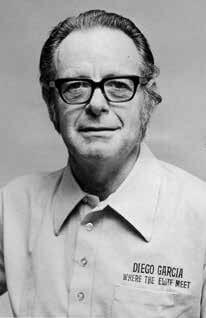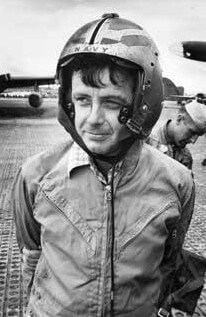Issue:
Legendary Stars and Stripes journalist and former FCCJ member Hal Drake died of stomach cancer on Jan. 27 in a hospice in Queensland, Australia. He was 83.
Drake spent nearly four decades with the newspaper, covering everything from high level summits and the release of POWs from Vietnam to boxer Muhammad Ali and high school sports.
But as well as Drake the newsman, there was Drake the FCCJ fellow member, who charmed and amused us in jolly afternoons in the Main Bar, recalled FCCJ and AP veteran Richard Pyle.
“I imagine very few people at the Club today remember Hal or the fight some of us waged to get him accepted as a regular member,” said Pyle. Drake was already known as a solid professional journalist and storyteller, but for many years, some members objected on grounds that he worked for Stars and Stripes, the U.S. military paper published in Tokyo since shortly after WWII.
Some Drake supporters at the time made the point that it was ridiculous that reporters working for state publications such as TASS and Pravda could be regular members but not Stripes correspondents.
“We prevailed on the technical but bona fide argument that S&S was an ‘authorized but unofficial’ publication, available at the FCCJ and widely read beyond its military audience,” Pyle said. Hal became a full regular member in October 1984, and he and his wife, the beautiful and irrepress ible Kaz, became regulars at the Club, enriching its social scene for many years.
Even before that, he managed to get into the Club when getting the news required it, as he remembered in a 1995 memoir in the No. 1 Shimbun: “The first time I was in the Club was early November of 1956 covering the moving, never forgotten story of the Hiroshima Maidens.
“These were 13 young women who, as children, had been hideously scarred and crippled by that sunburst.They were returning from a year of treatment in the States. One of them, Michiyo Zomen, was close to tears as she said: ‘I dreamed for 10 years of being able to use my arms again. We can never forget our deep feelings for everybody who helped us and we can never return their kindness.’
“I was close to tears myself,” wrote Drake.
Brad Martin, former FCCJ board member now in Hawaii recalls, “In my first month in Japan, in the fall of 1977, I was invited to the old Sanno Hotel, run by the U.S. military, for a reception in honor of some general. When I walked in and headed for the bar, a gray haired man in a gray suit chatted me up, discovering immediately that I was a Baltimore Sun newsman newly arrived. ‘Some people come here and never go home,’ he said, peering intently at me. ‘You look like one of those.’ I still live for at least half the year in Japan, after all those 35 plus years. The man was right. He was Hal Drake.”
One of his eccentricities was his “whirligig,” a coil of wire that he used to juggle when working on story ideas. When that was wiggling, it was a sign that Drake was in creative mode. It became his signature quirk.
“Hal clearly would have managed to spend his life as a storyteller even if writing had never been invented. He was one of the true greats. A fabulous writer and one of the last of the FCCJ’s true raconteurs. We shall miss Hal greatly,” said Martin.
In the 1995 article, Drake modestly wrote, “My memory is frequently a miasma of names, faces, long ago happenings that were once so important but now never told to the easily bored young.”
“And one of the greatest events being admitted at last to the FCCJ the lively and intelligent company of Max Desfor, Jim Colligan, Richard Pyle, Jack Russell, Bruce Dunning, Pat Killen, and so many others. I could return only one Thanksgiving dinner a year.”
Charles Pomeroy, who shared many experiences with Hal Drake over the years, recalled those dinners. “First among my memories of Hal would be those long ago ‘Turkey Days,’ as Hal called them.
“To make such sumptuous feasts, Hal and Kaz no doubt started preparations at least a day ahead of time for these special occasions. And feasts they were, ‘with all the trimmings,’ including a rarity in Tokyo, cranberry sauce. Pumpkin pie was the dessert, of course. Hal and Kaz hosted these social gatherings every year until their move to Australia after Hal’s retirement in 1995.
But Pomeroy has a later memory. “Following the Drakes’ move to Australia, they invited Atsuko and I, in 1996, for a week’s stay at their place on the Gold Coast,” said Pomeroy. “Needless to say, it was educational as well as entertaining in Hal’s special way (yes, he still twirled the whirligig). A didgeridoo brought back as a memento still stands in the corner of our living room as a reminder of that visit.”
From all of Hal’s old friends at the Club: Thanks, Hal, for some great memories. RIP.
Geoff Tudor writes for Orient Aviation, Hong Kong



